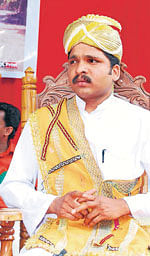Tradition and modernity go hand in hand for Kerala’s exotic Mannan tribe.

The tribe, which mostly resides in the hills of Kerala’s Idukki district bordering Tamil Nadu, has effortlessly merged with the outside world but it continues to observe age-old customs and revere the concept of kingship and looks up to the king for fulfilling all spiritual needs and upkeep of tribal traditions. Its adherence to age old customs became evident to the outer world recently when its king died and tribal elders collectively decided to enthrone a new king.
The Mannan king looks after his subjects settled in around 42 “kudis” (settlements) in Idukki from his headquarters called Kovilmala (called Kozhimala by others).
Recently, the tribe elected the new king following the untimely death of reigning King Ariyan Rajamannan. Ariyan, who was only 30 years, died of stomach and liver related ailments. Ariyan, whose original name was Ramesan, became the king in 2007.
The tribe follows matrilineal system according to which Ariyan’s nephew was to become the king. But under the peculiar circumstances existing at present, tribal elders opted to enthrone eldest uncle of Arian Raghavan Raman as the new king.
The selection of king is a complex process involving “psychic revelation”and acceptance among the “Kaanis,” who are leaders of various Mannan “kudis”. These tribal elders play a pivotal role in the administration of the Mannan community along with the king. The king will add the title Rajamannan ( meaning King of Mannans) to his name and he is enthroned at a function held in traditional manner at Kovilmala. According to the custom, a new king needs to be enthroned on the seventh day of the death of a reigning king.
A new king will start his formal rule only after he receives presents during ‘Kalavoottu’ festival, which is the biggest festival of the community. Chiefs from all 42 settlements would arrive at Kovilmala on the occasion to pay tribute to the king. Dance by men who will be in women’s attires, is the main feature of the festival.
The tribe ,currently numbering around 50,000, has a rich legacy going back to several hundreds of years. They consider Goddess Meenakshi, principal deity of Madurai Meenakshi temple, as their deity. There are opinions that their services were once utilised by Pandyan kings who ruled from Madurai during 13th century.
The community once held its domain over the Kerala-Tamil Nadu border with its headquarters at Mannan Kotai, also believed to be in Idukki district, before coming to the present area. According to folklore, they later accepted suzerainty of Raja of Poonjar, in Kerala who used their help to cultivate large tracts of land
adjoining the thick forests in the Western Ghats. But legends say Poonjar king lost a war with the king of Maravas from Tamil Nadu. Following this, Poonjar king was forced to retreat to the forests and Mannans also lost their lands.
But during 18th century kingdom of Venad under Marthanda Varma become very powerful in southern Kerala and southern parts of present Tamil Nadu and during the period Varma annexed Poonjar and adjoining regions to his kingdom and the right over the Mannan community passed on to the Maharaja of Venad. Under Varma, Venad expanded and became Travancore. Travancore kings gave Mannans special titles and the right to wear bangles and carry a cane as mark of their position. When they were with Travancore, they had the sole right over harvesting wild cardamom and other spices and hill produces, which were the key sources of income for the kingdom.
Mannan tribe is a peace loving community which has joined the mainstream, Kerala revenue officials told Deccan Herald. Now, the tribe has lost its special rights over cardamom and spices and is generally dependent on collecting forest produce for their livelihood. Some of them have taken to other jobs and agriculture.
House for king
As per the state government’s policy of allowing the tribe to preserve its customs, the position of king is accepted on certain matters, said revenue officials. The Kerala government had built a house for the former Mannan King Ariyan at Kovilmala. The funeral of former king was held with state honours.
The King gets a certain amount of respect in public society as the leader of the tribe. He is often invited to public functions and has certain powers in the tribe also, said locals.
According to locals, the king settles disputes among members of the tribe and still his words command respect. He has power to ostracise members of the
community who fail to obey the orders. The king is assisted by nine ministers who help him to arrive at decisions and implement it. But government officials say the community members go by laws of the land in all criminal and civil disputes.
Though the kingship is confined to one family and normally a king loses his power only when he dies, tribal assembly consisting of leaders of 42 settlements have the right to remove him in extreme cases. There was a move to oust Ariyan before he died. But the move did not succeed as less than eight tribal colony chiefs
supported such a move.
Despite claims of government officials of spending several crores of rupees for the uplift of Mannan tribe, locals say a majority of Mannans still continue to lead a primitive life. Large sections of the community are addicted to liquor and there are reports that Ariyan, the king who recently died had developed complications from heavy drinking.